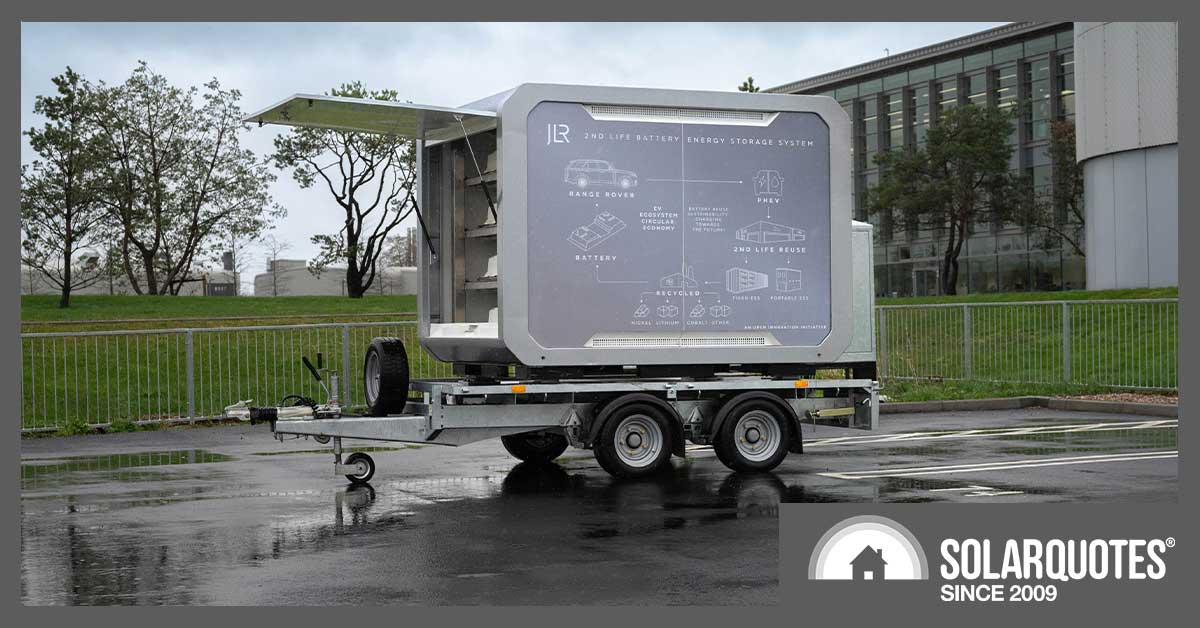When you think of Range Rovers, the words “eco-friendly” and “sustainable” probably don’t immediately come to mind.
And you’d be correct. They are some of the most polluting passenger vehicles you can buy. But at least Jaguar Land Rover (JLR) is working on one full electric model for each of the Range Rover, Discovery and Defender lines by the end of the decade (better late than never). At the same time, Jaguar promises to be entirely electric by 2030.
Until then, the darkest of dark green options for your Toorak Tractor is the Range Rover PHEV plug-in hybrid petrol version with a 38 kWh battery.
But what happens when the 3-and-a-half-ton PHEV reaches the end of its glitzy life in the inner suburbs? Will those 3 Powerwalls’ worth of battery go straight to landfill?
Happily not.
In a new partnership with energy storage startup Allye, JLR has developed a portable Battery Energy Storage System (BESS) using second-life batteries from its Range Rover and Range Rover Sport plug-in hybrid vehicles1.
“JLR’s batteries can be safely deployed in low-energy situations once their health falls below electric vehicle requirements, which typically leaves a 70-80% residual capacity. Following these second-life use cases, JLR will recycle the batteries so that raw materials can be recovered for re-use as part of a true circular economy.”
Each BESS unit contains seven repurposed Range Rover batteries and can store 270kWh of energy. JLR claims the portable battery packs will provide:
- “zero-emission power” for JLR’s remote vehicle testing and development, replacing diesel generators2.
- “help JLR’s network of over 3000 retailers better leverage renewable energy such as solar and act as energy buffers to support fast charging where the local grid connection may be restricted.”
- “be commercially available for use outside of JLR.”
So, while the idea of an eco-friendly Range Rover is still an oxymoron, it’s another example of large EV batteries finding a second life as stationary storage. Once the batteries reach the end of their second life, JLR promises to “recycle the batteries so that raw materials can be recovered for re-use as part of a truly circular economy”.
Whether Range Rovers are your cup of tea or not, their persistent popularity ensures they will be around for a while. It’s encouraging to see JLR making gradual progress toward an all-electric future, and every small step in this direction is a positive move in my book.


 RSS - Posts
RSS - Posts



If there are any left to repurpose given the vehicles keep burning. They have heaps of problems with fire including diesel under pressure that hits the exhaust manifold and makes them catch fire. Given they are the most flammable vehicles around how many will be available to repurpose.
https://www.dailymail.co.uk/news/article-12619137/Range-Rover-fire-sparked-Luton-airport-car-park-collapse-comes-six-years-Land-Rover-destroyed-Liverpools-Echo-Arena-car-park-six-months-4×4-recalls.html
I wasn’t aware of the fire problem with diesel Land Rovers. The press are quick to “blow up” EV fire stories but seem to ignore ICE fires, unless a multi-million car park and many vehicles are destroyed.
Back on topic … the BESS idea is cute but, as Finn’s footnotes point out, not a great win for the environment.